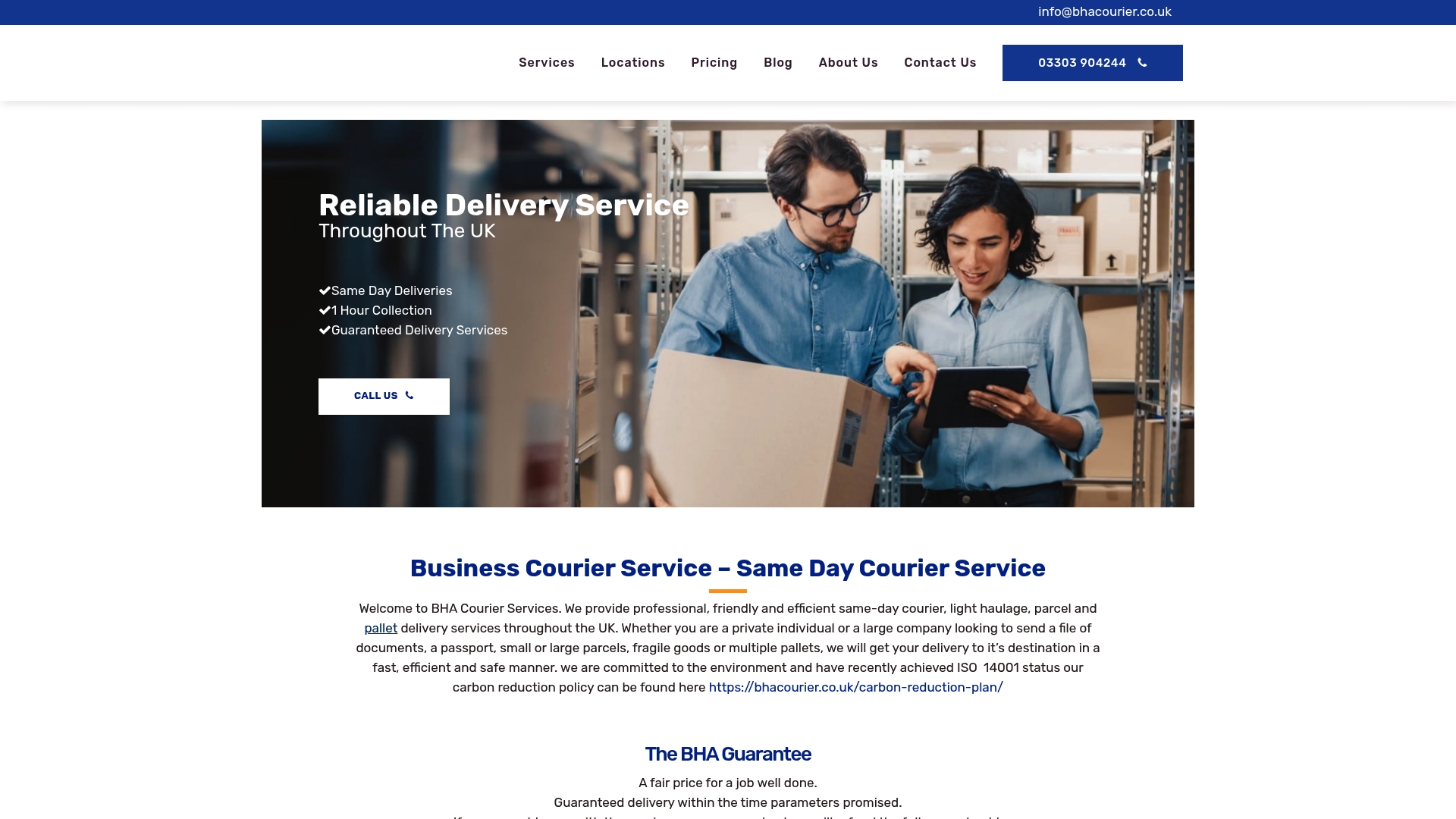
27 Jul Streamlining Supply Chain in the UK: Expert Tips for 2025
Supply chain headaches are costing UK businesses more than many realise. In fact streamlined operations can slash costs by up to 15 percent while improving delivery speeds. Oddly though, the flashiest technology is not what delivers the biggest advantage. It is actually the clever mix of smart planning and reliable partnerships that unlocks the real power behind those numbers.
Table of Contents
- Key Benefits Of Streamlining Supply Chain
- Essential Steps For Efficient Supply Chain Management
- Technology Tools To Optimise Your Supply Chain
- Best Practices For Time-Sensitive Deliveries In The Uk
Quick Summary
| Takeaway | Explanation |
|---|---|
| Streamline for Efficiency | Optimising supply chains reduces costs and improves operational performance significantly. |
| Enhance Customer Service | Improved responsiveness leads to better customer satisfaction and loyalty. |
| Leverage Technology Tools | Use ERP systems, IoT, and AI for better tracking and decision-making. |
| Build Strong Supplier Relationships | Collaborating closely with suppliers increases reliability and efficiency. |
| Adopt Continuous Improvement | Regular evaluation helps organisations adapt and enhance time-sensitive delivery methods. |
Key Benefits of Streamlining Supply Chain

Streamlining supply chain operations has become a critical strategy for businesses seeking to enhance operational efficiency and maintain competitive advantage in today’s dynamic market landscape. By implementing strategic improvements, organisations can transform their logistical processes and unlock significant performance benefits.
Enhanced Operational Efficiency and Cost Reduction
Business leaders recognise that effective supply chain management directly impacts overall organisational performance. According to the World Economic Forum, streamlining supply chains enables businesses to enhance efficiency, dramatically reduce operational costs, and accelerate time-to-market capabilities. Companies that successfully optimise their supply chain can expect substantial financial advantages.
The key financial benefits include reduced inventory holding costs, minimised waste, and improved resource allocation. By implementing advanced tracking systems and predictive analytics, organisations can precisely manage stock levels, eliminate unnecessary expenditures, and create more streamlined procurement processes.
Improved Customer Service and Responsiveness
Research from Seattle University’s Albers School of Business highlights that effective supply chain management significantly enhances customer service quality and boosts customer loyalty. When businesses can respond rapidly to market demands and customer requirements, they create a competitive edge that sets them apart from less agile competitors.
Improved supply chain processes enable faster delivery times, more accurate order fulfillment, and greater transparency throughout the logistics journey. Customers increasingly expect real-time tracking, precise delivery estimates, and seamless communication – all of which are achievable through sophisticated supply chain management strategies.
Digital Transformation and Technological Integration
A comprehensive study published in the National Center for Biotechnology Information emphasises the transformative potential of digital technologies in supply chain management. By integrating advanced technologies such as artificial intelligence, machine learning, and Internet of Things (IoT) devices, businesses can create more responsive and intelligent supply chain ecosystems.
Digital transformation allows for unprecedented levels of data collection, analysis, and predictive modeling. Companies can now anticipate potential disruptions, optimise routing, and make data-driven decisions that minimise risks and maximise operational efficiency. The result is a more resilient, adaptable supply chain that can quickly adjust to changing market conditions and unexpected challenges.
Through strategic streamlining, businesses can achieve remarkable improvements in operational performance, customer satisfaction, and overall competitive positioning. The journey towards an optimised supply chain requires commitment, investment in technology, and a holistic approach to logistics management.
To clarify the main benefits discussed, the following table summarises the key advantages of streamlining supply chains in the UK:
| Benefit Area | Description |
|---|---|
| Cost Reduction | Lower inventory holding costs, reduced waste, and optimised resource allocation |
| Enhanced Efficiency | Accelerated time-to-market and improved logistical processes |
| Customer Service Improvement | Faster deliveries, accurate order fulfillment, real-time tracking, and better communication |
| Greater Transparency | Visibility across logistics journey and order handling |
| Technological Transformation | Integration of AI, machine learning, IoT for advanced tracking and predictive analytics |
| Resilience and Adaptability | Ability to adjust to disruptions and changing market conditions |
Essential Steps for Efficient Supply Chain Management
Efficient supply chain management requires a strategic and comprehensive approach that goes beyond traditional logistics practices. Businesses must develop robust systems that can adapt to rapidly changing market conditions while maintaining operational excellence.
Strategic Planning and Resource Allocation
According to the UK government’s Critical Imports and Supply Chains Strategy, establishing a robust strategic framework is fundamental to supply chain resilience. The first essential step involves comprehensive planning that incorporates data-driven forecasting, coordinated scheduling, and proactive risk management.
Research from IMD Business School emphasises that effective planning involves developing sophisticated forecasting models that can anticipate market demands, potential disruptions, and resource requirements. This approach enables businesses to allocate resources more efficiently, reduce waste, and maintain flexibility in their operational strategies.
Supplier Relationship Management
Building and maintaining strong supplier relationships represents a critical component of efficient supply chain management. The Northern Ireland Business Info portal highlights the importance of carefully selecting suppliers and developing collaborative partnerships that prioritise mutual growth and reliability.
Successful supplier relationship management involves multiple strategic elements:
- Conducting thorough supplier assessments
- Establishing clear communication channels
- Implementing transparent performance evaluation metrics
- Developing collaborative improvement initiatives
- Ensuring ethical and sustainable procurement practices
By creating a network of trusted and high-performing suppliers, businesses can significantly enhance their supply chain’s overall reliability and efficiency.

Technology and Process Optimization
Digital transformation plays a pivotal role in modern supply chain management. Implementing advanced technologies such as artificial intelligence, machine learning, and real-time tracking systems enables businesses to create more responsive and intelligent supply chain ecosystems.
Key technological interventions include:
- Integrating comprehensive enterprise resource planning (ERP) systems
- Implementing IoT devices for real-time monitoring
- Utilising predictive analytics for demand forecasting
- Developing robust cybersecurity protocols
- Creating automated inventory management systems
These technological solutions provide unprecedented visibility, enabling businesses to make data-driven decisions, reduce operational risks, and respond swiftly to market changes.
By focusing on strategic planning, robust supplier relationships, and technological innovation, organisations can develop supply chains that are not just efficient, but genuinely competitive in today’s dynamic business environment. The journey towards supply chain excellence requires continuous learning, adaptation, and a commitment to holistic improvement.
The following table outlines essential steps mentioned for efficient supply chain management and their core activities:
| Step | Core Activities |
|---|---|
| Strategic Planning & Resource Allocation | Data-driven forecasting, coordinated scheduling, proactive risk management |
| Supplier Relationship Management | Supplier assessment, strong communication, performance evaluation, collaboration, sustainability |
| Technology & Process Optimisation | ERP integration, IoT monitoring, predictive analytics, cybersecurity, automated inventory |
Technology Tools to Optimise Your Supply Chain
In the rapidly evolving landscape of supply chain management, technological tools have become essential for businesses seeking to enhance operational efficiency, reduce costs, and maintain competitive advantage. Modern organisations are increasingly leveraging advanced digital solutions to transform their supply chain processes.
Enterprise Resource Planning (ERP) Systems
According to Gartner Research, Enterprise Resource Planning systems represent the cornerstone of modern supply chain technology. These comprehensive platforms integrate multiple business processes, providing real-time visibility and centralized control across procurement, inventory management, logistics, and financial operations.
Advanced ERP solutions offer businesses critical capabilities such as:
- Comprehensive data integration across departments
- Automated workflow management
- Real-time reporting and analytics
- Seamless communication between different operational units
- Enhanced decision-making through predictive insights
By implementing sophisticated ERP systems, organisations can streamline their supply chain processes, reduce manual interventions, and create more agile operational frameworks.
Internet of Things (IoT) and Tracking Technologies
Research from McKinsey & Company highlights the transformative potential of Internet of Things technologies in supply chain management. IoT devices enable unprecedented levels of tracking, monitoring, and data collection throughout the logistics ecosystem.
Key IoT applications in supply chain management include:
- GPS-enabled real-time asset tracking
- Environmental condition monitoring for sensitive goods
- Predictive maintenance for transportation and warehousing equipment
- Automated inventory management systems
- Enhanced route optimization technologies
These technologies provide businesses with granular insights into their supply chain operations, enabling more precise control and rapid response to potential disruptions.
Artificial Intelligence and Machine Learning Solutions
A comprehensive study by Deloitte demonstrates that artificial intelligence and machine learning are revolutionizing supply chain management. These advanced technologies enable businesses to process vast amounts of data, generate predictive models, and make intelligent, data-driven decisions.
AI and machine learning technologies offer transformative capabilities such as:
- Advanced demand forecasting
- Intelligent risk assessment and mitigation strategies
- Automated procurement optimization
- Dynamic pricing models
- Complex scenario modeling and simulation
By integrating AI-powered solutions, organisations can develop more responsive, intelligent supply chain ecosystems that can anticipate market changes and adapt proactively.
The future of supply chain management lies in the strategic integration of these technological tools. Businesses that invest in sophisticated digital solutions will be better positioned to navigate complex global markets, respond to unexpected challenges, and maintain operational excellence. Continuous technological innovation and a commitment to digital transformation are no longer optional but essential strategies for competitive success.
Best Practices for Time-Sensitive Deliveries in the UK
Time-sensitive deliveries represent a critical component of modern supply chain management, particularly in the UK’s dynamic and complex logistics landscape. Businesses must develop robust strategies to ensure rapid, reliable, and precise transportation of goods across various sectors and regions.
Strategic Planning and Risk Mitigation
According to the UK Government’s Future of Global Supply Chains project, developing comprehensive strategies for time-sensitive deliveries is essential for maintaining supply chain resilience. Organisations must anticipate potential disruptions and create flexible contingency plans that can adapt to unexpected challenges.
Key strategic elements include:
- Developing multiple transportation route alternatives
- Implementing real-time tracking systems
- Creating robust communication protocols
- Establishing clear performance metrics
- Building redundant logistics capabilities
Businesses can also explore rapid local delivery solutions for specific regions to enhance their time-sensitive delivery capabilities.
Technology and Infrastructure Optimization
The United Kingdom Food Security Report 2024 emphasises the critical role of advanced transport networks in ensuring timely goods movement. Companies must invest in cutting-edge technologies and infrastructure that support rapid, efficient deliveries across complex logistical environments.
Advanced technological interventions include:
- GPS-enabled real-time tracking systems
- Predictive analytics for route optimization
- Automated scheduling and dispatch platforms
- IoT-enabled monitoring of transportation conditions
- Advanced communication technologies
These technologies enable businesses to maintain precise control over time-sensitive deliveries, reducing potential delays and enhancing overall operational efficiency.
Adaptive Logistics and Continuous Improvement
A Financial Times report highlights how businesses are increasingly leveraging artificial intelligence and machine learning to enhance supply chain visibility and responsiveness. Continuous adaptation and learning represent crucial components of successful time-sensitive delivery strategies.
Organisations should focus on:
- Regular performance analysis and benchmarking
- Continuous staff training and skill development
- Embracing emerging technological innovations
- Developing agile decision-making processes
- Maintaining flexible operational frameworks
By adopting a proactive and adaptive approach, businesses can create supply chain ecosystems that are not just responsive but genuinely predictive and intelligent.
Successful time-sensitive deliveries in the UK require a holistic approach that combines strategic planning, technological innovation, and a commitment to continuous improvement. Organisations that invest in robust systems and maintain flexibility will be best positioned to navigate the complex challenges of modern logistics.
Frequently Asked Questions
What are the main benefits of streamlining the supply chain?
Streamlining the supply chain can lead to enhanced operational efficiency, significant cost reductions, improved customer service, greater transparency, and increased resilience through digital transformation.
How can technology improve supply chain management?
Technology such as ERP systems, IoT devices, and AI solutions enhance supply chain management by providing real-time visibility, predictive analytics, and automation, enabling businesses to make data-driven decisions.
What steps should businesses take for efficient supply chain management?
Businesses should focus on strategic planning, building strong supplier relationships, and leveraging technology for process optimisation to create a responsive and efficient supply chain.
How can businesses manage time-sensitive deliveries effectively?
To manage time-sensitive deliveries effectively, organisations should develop strategic planning, invest in technology for tracking and optimisation, and adopt an adaptive approach to logistics and continuous improvement.
Accelerate Your Streamlined Supply Chain with Proven Delivery Partners
Still facing the challenge of late deliveries, unpredictable shipment times, or fragile goods arriving damaged? The article has highlighted how supply chain disruptions, lack of reliable partnerships and missed delivery targets can dramatically impact your operational efficiency and customer satisfaction. If your business needs rapid, transparent logistics that align with advanced planning and digital integration, your next step is crucial.

Thousands of UK businesses trust BHA Courier for secure, same-day or next-day courier solutions that help cut costs, improve tracking and guarantee peace of mind. Our nationwide network supports urgent business needs, whether you require light haulage, reliable parcel delivery, or secure document transport. Ready to see the benefits of a truly agile supply chain? Book your next delivery online today and transform your logistics into a competitive advantage while spaces remain for priority collections.


